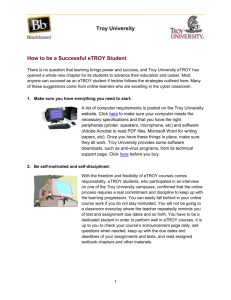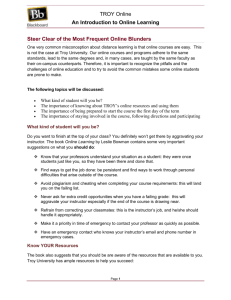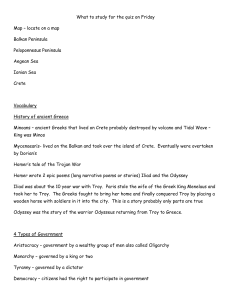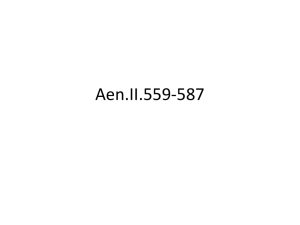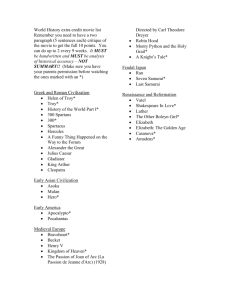TROY UNIVERSITY
advertisement
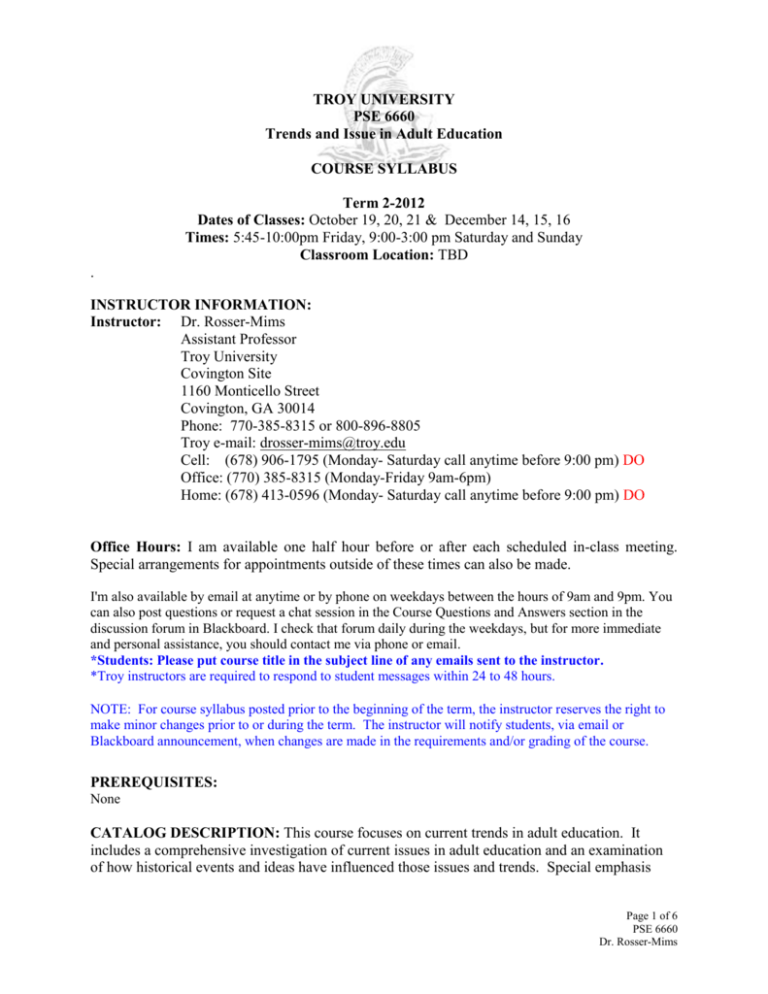
TROY UNIVERSITY PSE 6660 Trends and Issue in Adult Education COURSE SYLLABUS Term 2-2012 Dates of Classes: October 19, 20, 21 & December 14, 15, 16 Times: 5:45-10:00pm Friday, 9:00-3:00 pm Saturday and Sunday Classroom Location: TBD . INSTRUCTOR INFORMATION: Instructor: Dr. Rosser-Mims Assistant Professor Troy University Covington Site 1160 Monticello Street Covington, GA 30014 Phone: 770-385-8315 or 800-896-8805 Troy e-mail: drosser-mims@troy.edu Cell: (678) 906-1795 (Monday- Saturday call anytime before 9:00 pm) DO Office: (770) 385-8315 (Monday-Friday 9am-6pm) Home: (678) 413-0596 (Monday- Saturday call anytime before 9:00 pm) DO Office Hours: I am available one half hour before or after each scheduled in-class meeting. Special arrangements for appointments outside of these times can also be made. I'm also available by email at anytime or by phone on weekdays between the hours of 9am and 9pm. You can also post questions or request a chat session in the Course Questions and Answers section in the discussion forum in Blackboard. I check that forum daily during the weekdays, but for more immediate and personal assistance, you should contact me via phone or email. *Students: Please put course title in the subject line of any emails sent to the instructor. *Troy instructors are required to respond to student messages within 24 to 48 hours. NOTE: For course syllabus posted prior to the beginning of the term, the instructor reserves the right to make minor changes prior to or during the term. The instructor will notify students, via email or Blackboard announcement, when changes are made in the requirements and/or grading of the course. PREREQUISITES: None CATALOG DESCRIPTION: This course focuses on current trends in adult education. It includes a comprehensive investigation of current issues in adult education and an examination of how historical events and ideas have influenced those issues and trends. Special emphasis Page 1 of 6 PSE 6660 Dr. Rosser-Mims will be given to the analysis of trends and issues and formation of judgments based on supportable information. GOALS AND COURSE OBJECTIVES: By the end of the course, students will be able to do the following: 1. Analyze and critique current adult educational trends and issues. 2. Comprehend the historical development of American adult education from the colonial beginnings to the present. 3. Analyze the impact of political considerations, laws, governmental actions, court decisions, and commission reports on American adult educational practice/organizations. 4. Explain the influence of socio-economic, cultural, and philosophical factors affecting adult schooling. TEXTBOOK(S) AND/OR OTHER MATERIALS NEEDED: Reading material will be provided. Recommended Text: Publication manual of the American Psychological Association, (latest edition). Washington, DC: American Psychological Association *The textbook provider for Troy University is MBS Direct. The web site for textbook purchases is http://www.mbsdirect.net/Index.htm . COURSE REQUIREMENTS: Annotated Bibliography Paper Oral Presentation of Research Topic Adult Educator Interview 2 Article Critique Papers Discussion Leader/Class Participation 35% 15% 20% 30% A= 90-100 B= 80-89 C= 70-79 D=60-69 *Postings: I post grades in Blackboard, in the Grade book feature. F=59 and below STUDENT EXPECTATIONS Students are expected to attend all class meetings. Students are expected to come to each class meeting prepared to actively participate in discussions. Students are expected to post responses to discussion questions in the Blackboard discussion forum and react to postings. Some assignments may be posted on Blackboard. Minor adaptations may be made in the schedule as needed. They will be announced in class or on Blackboard. In class meetings and Blackboard discussions will operate in a context of academic freedom, with mutual respect for all viewpoints, even those with which we disagree. This is an important part of the learning process. The instructor is the facilitator of your learning. Each student should take active responsibility and initiative for his or her own learning. Page 2 of 6 PSE 6660 Dr. Rosser-Mims Troy State University’s “Standards of Conduct” are printed in the Troy State Graduate Bulletin. It states in part that the student may be disciplined, up to and including suspension and expulsion if found to be in violation of the “Standards of Conduct”. Violations include dishonesty, cheating, plagiarism, or knowingly furnishing false information to the university, faculty or other officers or employees of the university. (See page 4--HONESTY AND PLAGIARISM) Incompletes will be assigned for this class in case of emergencies and at the discretion of the faculty member. The student has responsibility for finishing the remaining assignments before the institutional deadline at which the incomplete will be automatically converted to an F. (See page 4-INCOMPLETE GRADE POLICY) Any student whose disabilities fall within the Americans With Disability Act (ADA) guidelines must inform me at the beginning of the term of any specials needs or equipment necessary to accomplish the requirements for this course. Students must also provide written proof of their disability to the instructor. Troy Email: All Students are required to obtain and use the TROY email address that is automatically assigned to them as TROY students. All official correspondence (including bills, statements, emails from instructors and grades, etc.) will be sent ONLY to the troy.edu (@troy.edu) address. All students are responsible for ensuring that the correct email address is listed in Blackboard prior to the #1 class meeting. Email is the only way the instructor can, at least initially, communicate with you. It is your responsibility to make sure a valid email address is provided. Failure on your part to do so can result in your missing important information that could affect your grade. INCOMPLETE GRADE POLICY: Missing any part of the course requirements may prevent completion of the course. If circumstances will prevent the student from completing the course by the end of the term, the student should complete a request for an incomplete grade. Note: A grade of incomplete or “INC” is not automatically assigned to students, but rather must be requested by the student by submitting a Petition for and Work to Remove an Incomplete Grade Form. Requests for an incomplete grade must be made on or before the date of the final assignment or test of the term. A grade of “INC” does not replace an “F” and will not be awarded for excessive absences. An “INC” will only be awarded to student presenting a valid case for the inability to complete coursework by the conclusion of the term. It is ultimately the instructor’s decision to grant or deny a request for an incomplete grade, subject to the policy rules below. Policy/Rules for granting an Incomplete (INC): An incomplete cannot be issued without a request from the student. To qualify for an incomplete, the student must: a. have completed over 50% of the course material and have a documented reason for requesting the incomplete. (50% means all assignments/exams up to and including the midterm point, test, and/or assignments.) b. be passing the course at the time of their request. If both of the above criteria are not met an incomplete cannot be granted. An INC is not a substitute for an F. If a student has earned an “F” by not submitting all the work or by receiving an overall F average, then the F stands. HONESTY AND PLAGIARISM: Page 3 of 6 PSE 6660 Dr. Rosser-Mims The awarding of a university degree attests that an individual has demonstrated mastery of a significant body of knowledge and skills of substantive value to society. Any type of dishonesty in securing those credentials therefore invites serious sanctions, up to and including suspension and expulsion (see Standard of Conduct in each TROY Catalog). Examples of dishonesty include actual or attempted cheating, plagiarism*, or knowingly furnishing false information to any university employee. *Plagiarism is defined as submitting anything for credit in one course that has already been submitted for credit in another course, or copying any part of someone else’s intellectual work – their ideas and/or words – published or unpublished, including that of other students, and portraying it as one’s own. Proper quoting, using strict APA formatting, is required, as described by the instructor. All students are required to read the material presented at: http://troy.troy.edu/writingcenter/research.html Students must properly cite any quoted material. No assignment may have no more than 20% of its content quoted from another source. Students who need assistance in learning to paraphrase should ask the instructor for guidance and consult the links at the Troy Writing Center. This university employs plagiarism-detection software, through which all written student assignments are processed for comparison with material published in traditional sources (books, journals, magazines), on the internet (to include essays for sale), and papers turned in by students in the same and other classes in this and all previous terms. The penalty for plagiarism may range from zero credit on the assignment, to zero in the course, to expulsion from the university with appropriate notation in the student’s permanent file. LIBRARY SUPPORT: The Libraries of Troy University provide access to materials and services that support the academic programs. The address of the University College Library web site, which is for all University College and eCampus students, is http://uclibrary.troy.edu. This site provides access to the Library’s Catalog and Databases, as well as to links to all Campus libraries and to online or telephone assistance by Troy Library staff. Additionally, the Library can also be accessed by choosing the “Library” link from the University’s home page, http://www.troy.edu. Page 4 of 6 PSE 6660 Dr. Rosser-Mims APPENDIX Issues and Trends In Adult Education 1. Accelerated Learning in Adult Education and Training and Development 2. Adult basic education: main issues and challenges 3. Adult Development 4. Adult education and ageism, senior learners 5. Adult education and discrimination; anti-racist education 6. Adult Education and Gay, Lesbian, Bisexual, and Transgendered Communities 7. Adult education and health promotion 8. Adult education and Native Americans 9. Adult Education and Public policy 10. Adult education and social change; social movements; popular education 11. Adult education and the environment 12. Adult Education for Native Americans 13. Adult education in prisons 14. Adult education, human rights; peace education; global education 15. Apprenticeship 16. Career Development Specialties for the 21st Century 17. Consumers' education 18. Distance Education 19. Diversity Training 20. E-Learning 21. International Models of Career-Technical Education 22. International Perspectives on Adult Education 23. Knowledge Workers 24. Labor education: Unions 25. Learning Organizations Page 5 of 6 PSE 6660 Dr. Rosser-Mims 26. Learning Styles 27. lifelong education: its meaning and implications 28. Literacy: Main issues and challenges 29. Mentoring and Work-Based Learning 30. Multiple Intelligences and Adult Education 31. Pedagogy Vs. Andragogy 32. Philosophical approaches to adult education 33. Postmodernism and Adult Education 34. Race and Gender in Adult Education 35. Role of Mentoring in Career Education 36. Roles for Adult Educators 37. Spirituality in the Workplace 38. Teaching Critical Reflection 39. The Mobile Worker in the Flexible Workplace 40. The Workforce Investment Act: Some Implications for Adult and Vocational Education 41. Theories Of Adult Learning 42. Traditional research; participatory research 43. Transformative learning 44. Virtual Learning: The Good, the Bad, and the Ugly 45. Virtual Networking for Career Development 46. Vocational Education Research Trends 47. Vocational Rehabilitation 48. Web-Based Training 49. Welfare Reform: What's at Stake for Adult and Vocational Education 50. Work Force Education: Beyond Technical Skills 51. Youth Councils and Career Development Page 6 of 6 PSE 6660 Dr. Rosser-Mims
